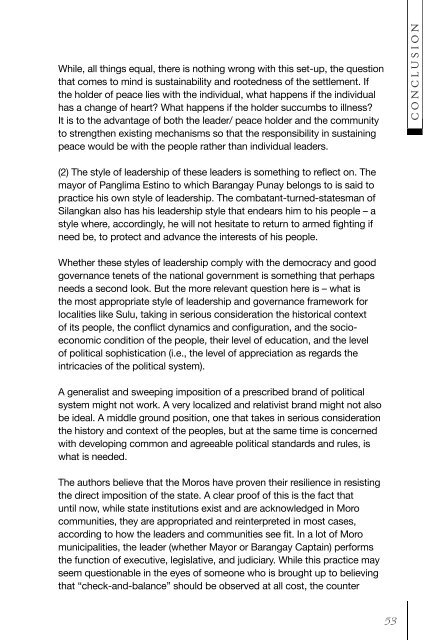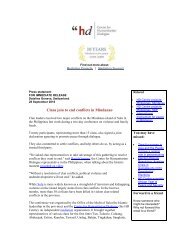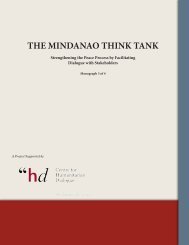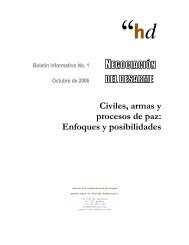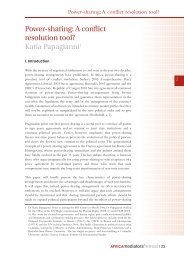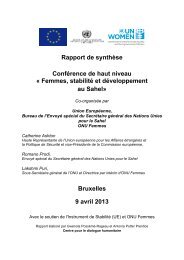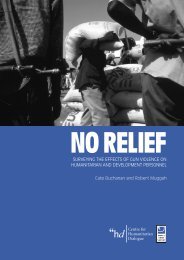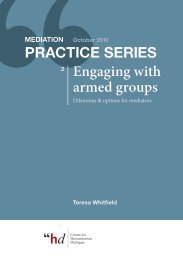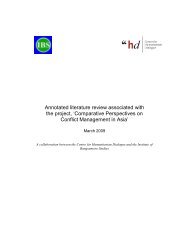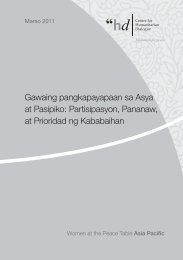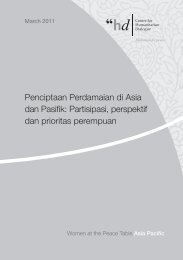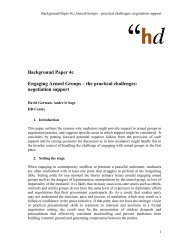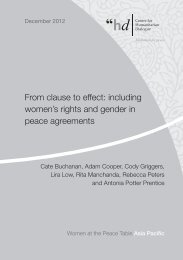Pagpati'ut - Centre for Humanitarian Dialogue
Pagpati'ut - Centre for Humanitarian Dialogue
Pagpati'ut - Centre for Humanitarian Dialogue
You also want an ePaper? Increase the reach of your titles
YUMPU automatically turns print PDFs into web optimized ePapers that Google loves.
While, all things equal, there is nothing wrong with this set-up, the question<br />
that comes to mind is sustainability and rootedness of the settlement. If<br />
the holder of peace lies with the individual, what happens if the individual<br />
has a change of heart What happens if the holder succumbs to illness<br />
It is to the advantage of both the leader/ peace holder and the community<br />
to strengthen existing mechanisms so that the responsibility in sustaining<br />
peace would be with the people rather than individual leaders.<br />
C O N C L U S I O N<br />
<br />
mayor of Panglima Estino to which Barangay Punay belongs to is said to<br />
practice his own style of leadership. The combatant-turned-statesman of<br />
Silangkan also has his leadership style that endears him to his people – a<br />
<br />
need be, to protect and advance the interests of his people.<br />
Whether these styles of leadership comply with the democracy and good<br />
governance tenets of the national government is something that perhaps<br />
needs a second look. But the more relevant question here is – what is<br />
the most appropriate style of leadership and governance framework <strong>for</strong><br />
localities like Sulu, taking in serious consideration the historical context<br />
<br />
economic condition of the people, their level of education, and the level<br />
of political sophistication (i.e., the level of appreciation as regards the<br />
intricacies of the political system).<br />
A generalist and sweeping imposition of a prescribed brand of political<br />
system might not work. A very localized and relativist brand might not also<br />
be ideal. A middle ground position, one that takes in serious consideration<br />
the history and context of the peoples, but at the same time is concerned<br />
with developing common and agreeable political standards and rules, is<br />
what is needed.<br />
The authors believe that the Moros have proven their resilience in resisting<br />
the direct imposition of the state. A clear proof of this is the fact that<br />
until now, while state institutions exist and are acknowledged in Moro<br />
communities, they are appropriated and reinterpreted in most cases,<br />
<br />
municipalities, the leader (whether Mayor or Barangay Captain) per<strong>for</strong>ms<br />
the function of executive, legislative, and judiciary. While this practice may<br />
seem questionable in the eyes of someone who is brought up to believing<br />
that “check-and-balance” should be observed at all cost, the counter<br />
53


